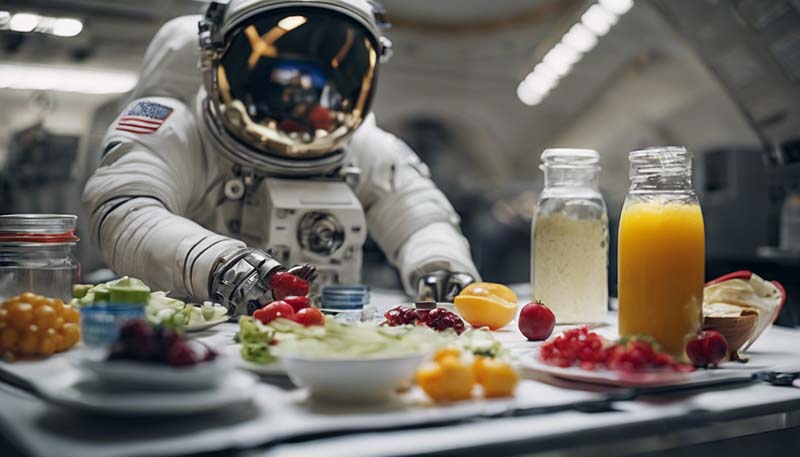The Space Diet: Nutrition for Astronauts
The Space Diet: Nutrition for Astronauts
Introduction
The nutritional needs of astronauts are unique and challenging to meet due to the extreme conditions of space travel. This article explores the importance of a well-balanced space diet, the challenges faced in providing it, and the innovations in space nutrition that have been developed to support the health and performance of astronauts on their missions.
The Importance of Nutrition in Space
Nutrition plays a vital role in maintaining the health, well-being, and performance of astronauts during space missions. A well-balanced diet is essential for several reasons:
- Health Maintenance: Proper nutrition helps to maintain the immune system, prevent illness, and support the body's ability to heal and recover from injuries.
- Performance: Adequate nutrition is necessary for astronauts to perform their duties effectively, especially during physically demanding tasks or emergency situations.
- Psychological Well-being: A varied and appealing diet can contribute to the psychological well-being of astronauts, helping to combat the stress and isolation of long-duration spaceflight.
Challenges in Space Nutrition
Several factors make providing adequate nutrition in space more challenging than on Earth:
Advertisement
- Microgravity: The absence of gravity affects the way food is prepared, consumed, and digested.
- Limited Space and Resources: Spacecraft have limited storage and cooling capabilities, which restricts the types and quantities of food that can be carried.
- Long Shelf Life: Food must have a long shelf life to last the duration of the mission without spoiling or becoming unsafe to eat.
- Sensory Deprivation: The senses of taste and smell can be diminished in microgravity, which can affect an astronaut's appetite and enjoyment of food.
Innovations in Space Nutrition
Over the years, significant advancements have been made in space nutrition to address these challenges:
- Dehydrated Foods: Early space missions relied on dehydrated foods that were rehydrated with water. These were lightweight and had a long shelf life but were often unappetizing.
- Thermally Stable Foods: Advances in food technology have led to the development of thermally stable foods that can be stored at room temperature for long periods without spoiling.
- Space Food Systems: Specialized food systems, such as the Space Food System used on the International Space Station (ISS), allow for a wider variety of foods to be prepared and consumed in microgravity.
- 3D Food Printing: Research is being conducted into 3D food printing as a way to provide fresh, customized meals for astronauts on long-duration missions.
Current Space Diets
The current diet for astronauts on the ISS includes a variety of food types:
- Meat Analogues: Foods such as chicken, beef, and shrimp are provided in a processed, rehydratable form.
- Vegetables and Fruits: A selection of fresh, frozen, and dehydrated vegetables and fruits are included to provide essential vitamins and minerals.
- Breads and Grains: A variety of breads, tortillas, and cereals are available to provide carbohydrates and fiber.
- Desserts and Snacks: Astronauts can enjoy a range of desserts and snacks, including cookies, candy, and nuts, to supplement their diet.
- Beverages: Water, fruit juices, and sports drinks are provided to maintain hydration and replenish electrolytes.
Future Directions in Space Nutrition
As space exploration continues to evolve, so too will the field of space nutrition. Future developments may include:
- Bioregenerative Life Support Systems: The use of plants and other biological systems to provide fresh food and oxygen on long-duration missions.
- Artificial Gravity: The creation of artificial gravity environments may help to mitigate some of the physiological effects of microgravity on taste and digestion.
- Cultural and Personalized Nutrition: As more international astronauts participate in space missions, there will be a need to accommodate a wider variety of cultural and personal dietary preferences.
- Nutritional Countermeasures: Research into the specific nutritional needs of astronauts to counteract the effects of microgravity on bone density, muscle mass, and cardiovascular health.
Conclusion
Space nutrition is a complex and evolving field that plays a critical role in the success of space missions. As our ability to explore the cosmos expands, so too will our understanding of how to best support the nutritional needs of astronauts. The continued development of innovative solutions to the challenges of space nutrition will be essential for the health, performance, and well-being of those who venture beyond our planet.

Comments